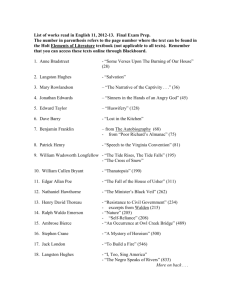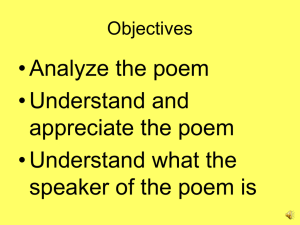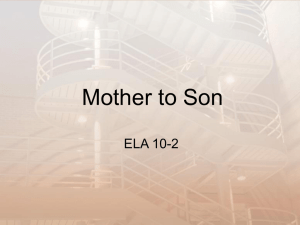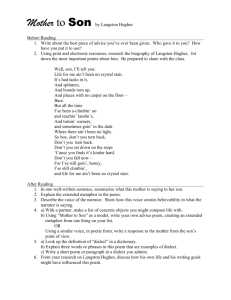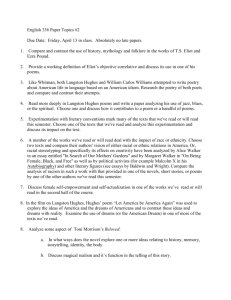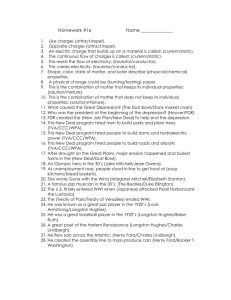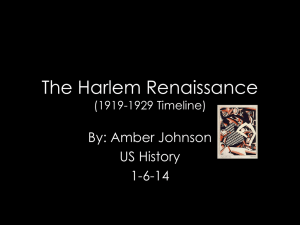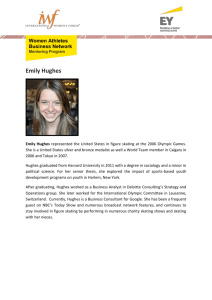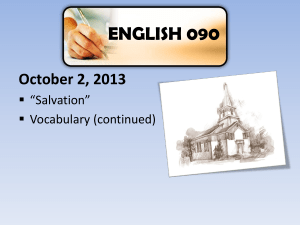The Inaugural Address of Barack Obama Lesoon plan adapted by
advertisement
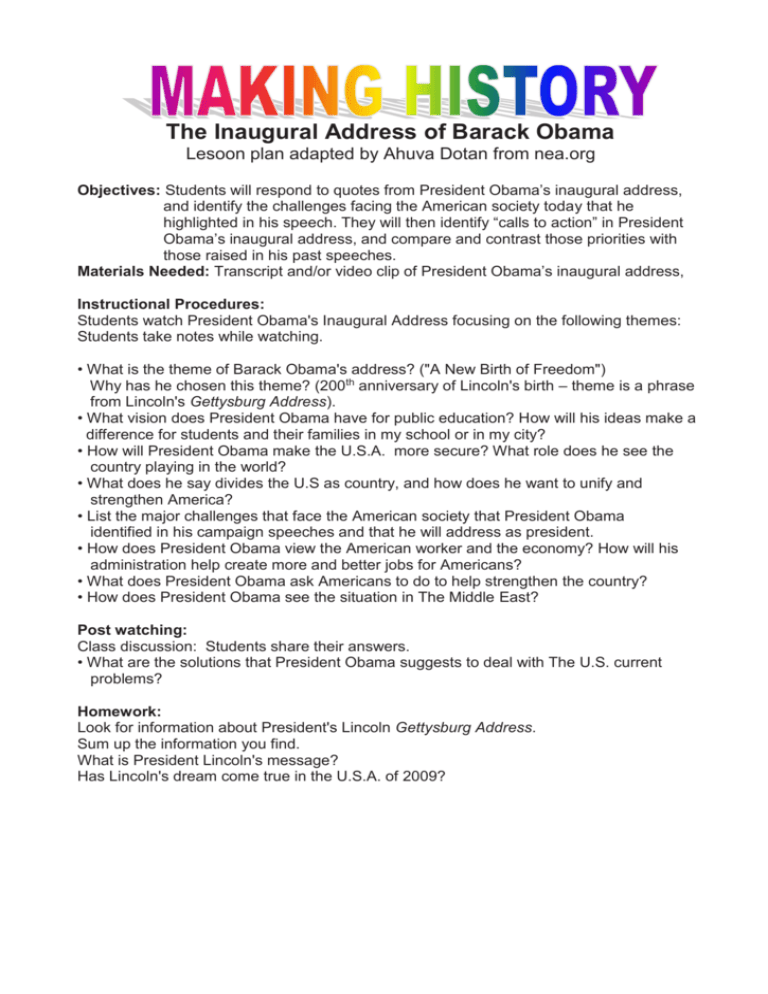
The Inaugural Address of Barack Obama Lesoon plan adapted by Ahuva Dotan from nea.org Objectives: Students will respond to quotes from President Obama’s inaugural address, and identify the challenges facing the American society today that he highlighted in his speech. They will then identify “calls to action” in President Obama’s inaugural address, and compare and contrast those priorities with those raised in his past speeches. Materials Needed: Transcript and/or video clip of President Obama’s inaugural address, Instructional Procedures: Students watch President Obama's Inaugural Address focusing on the following themes: Students take notes while watching. • What is the theme of Barack Obama's address? ("A New Birth of Freedom") Why has he chosen this theme? (200th anniversary of Lincoln's birth – theme is a phrase from Lincoln's Gettysburg Address). • What vision does President Obama have for public education? How will his ideas make a difference for students and their families in my school or in my city? • How will President Obama make the U.S.A. more secure? What role does he see the country playing in the world? • What does he say divides the U.S as country, and how does he want to unify and strengthen America? • List the major challenges that face the American society that President Obama identified in his campaign speeches and that he will address as president. • How does President Obama view the American worker and the economy? How will his administration help create more and better jobs for Americans? • What does President Obama ask Americans to do to help strengthen the country? • How does President Obama see the situation in The Middle East? Post watching: Class discussion: Students share their answers. • What are the solutions that President Obama suggests to deal with The U.S. current problems? Homework: Look for information about President's Lincoln Gettysburg Address. Sum up the information you find. What is President Lincoln's message? Has Lincoln's dream come true in the U.S.A. of 2009? Langston Hughes and the Harlem Renaissance Lesson plan adapted by Ahuva Dotan from Module F Literature Course, Matach - http://top.cet.ac.il/ Biography of Langston Hughes - Famous Poets Langston Hughes (February 1, 1902 – May 22, 1967) was an American poet, novelist, playwright, short story writer, and newspaper columnist. Hughes is best known for his work during the Harlem Renaissance. Langston Hughes was born James Mercer Langston Hughes in Joplin, Missouri, the son of Carrie Langston Hughes, a teacher, and her husband, James Nathaniel Hughes. After abandoning his family and the resulting legal dissolution of the marriage later, James Hughes left for Cuba first, then Mexico due to enduring racism in the United States. After the separation of his parents, young Langston was left to be raised mainly by his grandmother, Mary Langston, as his mother sought employment. Through the black American oral tradition of storytelling, she would instill in the young Langston Hughes a sense of indelible racial pride. He spent most of childhood in Lawrence, Kansas. After the death of his grandmother, he went to live with family friends, James and Mary Reed, for two years. His childhood was not an entirely happy one, due to an unstable early life, but it was one that heavily influenced the poet he would become. Later, he lived again with his mother in Lincoln, Illinois who had remarried when he was still an adolescent, and eventually in Cleveland, Ohio where he attended high school. Langston Hughes in Cleveland, Ohio high school circa 1919-1920, he was designated class poet because of, Hughes said later as an adult, his race, African Americans then being stereotyped as having rhythm. "I was a victim of a stereotype. There were only two of us Negro kids in the whole class and our English teacher was always stressing the importance of rhythm in poetry. Well, everyone knows — except us — that all Negroes have rhythm, so they elected me as class poet." ….. Upon graduating from high school in June of 1920, Hughes returned to live with his father, hoping to convince him to provide money to attend Columbia University. Hughes later said that, prior to arriving in Mexico again, "I had been thinking about my father and his strange dislike of his own people. I didn't understand it, because I was a Negro, and I liked Negroes very much." … James Hughes did not support his son's desire to be a writer. Eventually, Langston and his father came to a compromise. Langston would study engineering so long as he could attend Columbia. His tuition provided, Hughes left his father after more than a year of living with him. While at Columbia in 1921, Hughes managed to maintain a B+ grade average. He left in 1922 because of racial prejudice within the institution, and his interests revolved more around the neighborhood of Harlem than his studies, though he continued writing poetry. Hughes' life and work were enormously influential during the Harlem Renaissance of the 1920s alongside those of his contemporaries, …. Hughes wrote what would be considered the manifesto for himself and his contemporaries published in The Nation in 1926, The Negro Artist and the Racial Mountain: The younger Negro artists who create now intend to express our individual dark-skinned selves without fear or shame. If white people are pleased we are glad. If they are not, it doesn't matter. We know we are beautiful. And ugly, too. The tom-tom cries, and the tom-tom laughs. If colored people are pleased we are glad. If they are not, their displeasure doesn't matter either. We build our temples for tomorrow, strong as we know how, and we stand on top of the mountain free within ourselves. Hughes was unashamedly black at a time when blackness was démodé, and, he didn’t go much beyond the themes of black is beautiful as he explored the black human condition in a variety of depths. His main concern was the uplift of his people who he judged himself the adequate appreciator of and whose strengths, resiliency, courage, and humor he wanted to record as part of the general American experience. Thus, his poetry and fiction centered generally on insightful views of the working class lives of blacks in America, lives he portrayed as full of struggle, joy, laughter, and music. Permeating his work is pride in the African American identity and its diverse culture. "My seeking has been to explain and illuminate the Negro condition in America and obliquely that of all human kind," Hughes is quoted as saying. Therefore, in his work he confronted racial stereotypes, protested social conditions, and expanded African America’s image of itself; a “people’s poet” who sought to reeducate both audience and artist by lifting the theory of the black aesthetic into reality. Moreover, Hughes stressed the importance of a racial consciousness and cultural nationalism absent of self-hate that united people of African descent and Africa across the globe and encouraged pride in their own diverse black folk culture and black aesthetic. Langston Hughes was one of the few black writers of any consequence to champion racial consciousness as a source of inspiration for black artists. On May 22, 1967, Hughes died from complications after abdominal surgery related to prostate cancer at the age of 65. His ashes are interred beneath a floor medallion in the middle of the foyer leading to the auditorium named for him within the Arthur Schomberg Center for Research in Black Culture in Harlem. Adapted from: http://www.todays-woman.net/article1666.html I, Too by Langston Hughes I, too, sing America. I am the darker brother. They send me to eat in the kitchen When company comes, But I laugh, And eat well, And grow strong. Tomorrow, I'll be at the table When company comes. Nobody'll dare Say to me, "Eat in the kitchen," Then. Besides, They'll see how beautiful I am And be ashamed-- o o o o o o o o o o o Who is the speaker of the poem? Where does the poem take place? Who sends him to eat in the kitchen? What does he do there? Who is the darker brother? What does eating and growing stronger represent? What is the significance of being at the table? "I, too, sing America." Who else sings? Compare the life of the master to the life of the dark brother Will the speaker be able to tell them he won't eat in the kitchen? What do you learn from the poem about the situation of the Blacks in that period? o How is life different today than what it used to be in the past? Post Reading Activity Students formulate a response relating the poem to the development of the Black Movement in the USA, or comparing it to something a bit closer to home here, with the more recent immigrants to Israel, or the Palestinians, for example. How are the issues raised in the poem relevant to 1) your life Or 2) life in Israel? Students choose ONE of the following tasks: o o o o Written Essay (180-200 words) Photo Essay / PPT (12-15 slides with meaningful captions between photos) Dramatic Presentation (at least 3 minutes in length) Rap/Song (original, at least 3 minutes in length)
